Middle East
Israeli attacks kill two more as Syria government reaches deal with Druze | News
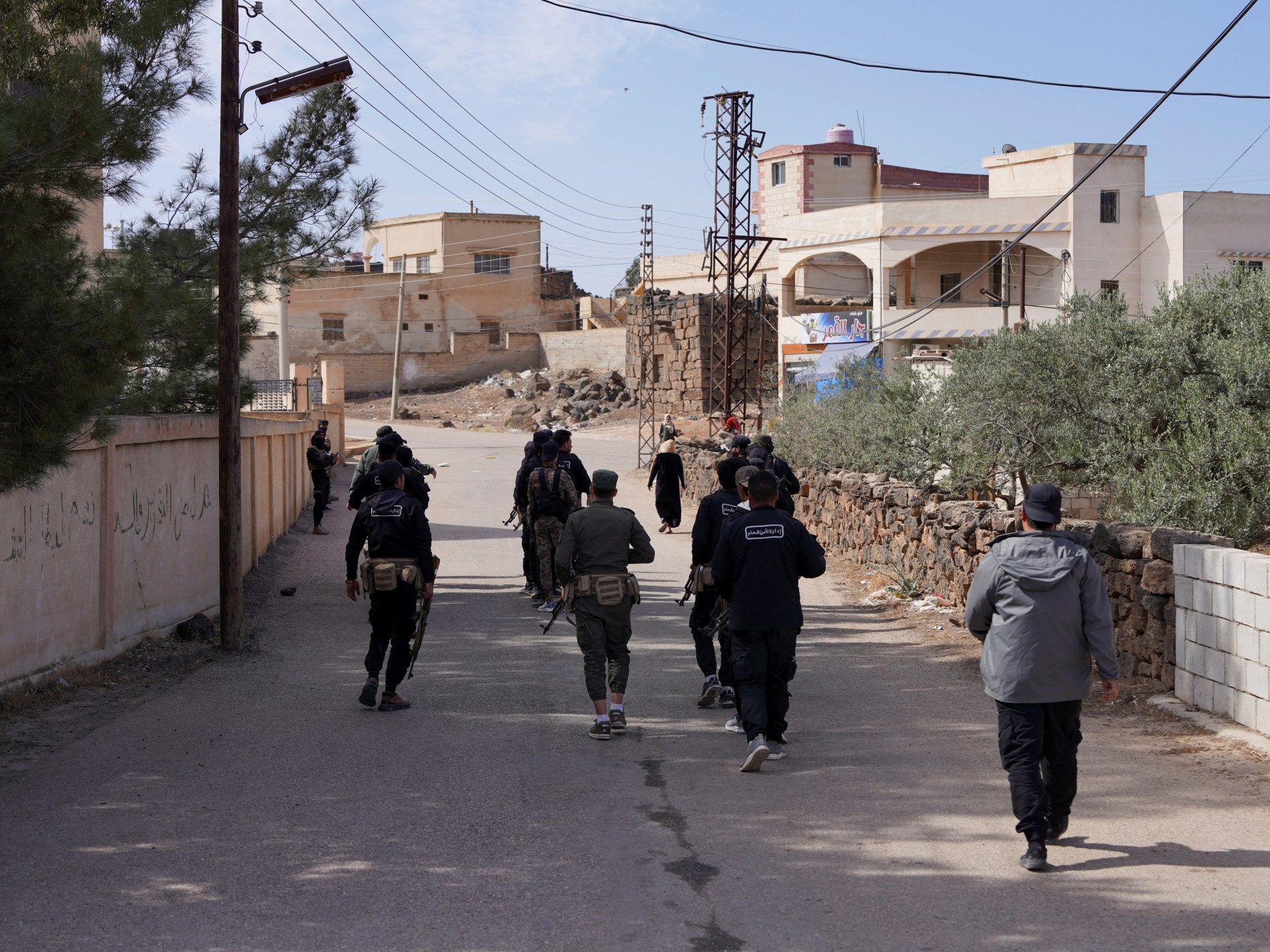
Israel has accused Syria of failing to protect the Druze as Israeli forces occupy and attack parts of the country.
Overnight Israeli air raids on Syria have killed at least two civilians as Israel has stated it is carrying out attacks to protect the Druze minority from government violence, a stance the Syrian Druze community itself rejects.
At least eight people were also reported injured after some 15 air raids hit multiple areas in Syria after midnight Saturday, with at least eight attacks hitting its capital Damascus.
The Israeli military confirmed the attacks on Saturday, saying its forces “struck a military site, anti-aircraft cannons and surface-to-air missile infrastructure in Syria” without giving further details or any evidence.
It comes a day after Israel carried out an attack near Syria’s presidential palace and Prime Minister Benjamin Netanyahu said he would not allow Syrian forces to deploy south of Damascus nor tolerate “any threat to the Druze community”.
More than 100 people were killed this week during fighting between pro-government forces and Druze fighters in Syria.
Reporting from the Damascus suburb of Jaramana where clashes took place between pro-government forces and Druze fighters, Al Jazeera’s Imran Khan said there was an uneasy calm on Saturday.
“A lot of people were in absolute fear. The fighters came in from multiple directions during the clashes on Tuesday, but they were beaten back by the security forces and then Jaramana was put under curfew for at least two days.”
He said during that time, a Druze delegation came in to reassure people that security would return.
Syrian government forces in Damascus and the Druze stronghold of Suwayda province in the southern part of the country reached agreements with Druze leaders to increase security and take in some heavy weapons held by fighters.
“A local force from the Ministry of Defence will now be responsible for security as part of the deal here and in Suwayda,” said Khan.
“But the armed fighters are said to be rogue elements of the fighting forces who were fighting the Bashar al-Assad regime that fell. That’s a real concern, because it feels to many Syrian people like elements are trying to destabilise the country by stoking sectarian tensions.”
He added that the Israeli claim of wanting to protect the Druze has been met with a lot of scepticism from the Druze community.
“They say they can deal with this issue in-house and don’t need Israel to step up. They also point to the way the Druze are regularly mistreated in Israel and how they have had their homes and communities destroyed to make way for illegal Israeli settlements. The feeling here is that the Israeli prime minister is using this to put pressure on Syrian President Ahmed al-Sharaa and attack targets in Syria.”
On Saturday, the United Nation’s Special Envoy for Syria Geir Pedersen said he “strongly condemns Israel’s continued and escalating violations of Syria’s sovereignty, including multiple air strikes in Damascus and other cities”.
The Israeli military, which continues to occupy parts of Syria, including the Golan Heights, has continued to launch attacks across the country despite international condemnation.
“Despite the challenges, the foreign threats and the Israeli planes, we are present and nothing can prevent us from protecting our people or prevent us from carrying out our duty towards our people,” Ammar al-Hariri, a commander with the Syrian security forces, said from the town of al-Soura al-Kubra in Suwayda.

Salman Olaiwi, a resident of the town, said people felt “relieved” when they heard about the agreement between the government and Druze leaders.
“What good have Israeli threats done us? The Israelis are on their own. As for us, those close to us are better than those far away.”
Middle East
Israelis protest for captives, against Netanyahu’s Gaza war expansion | Israel-Palestine conflict News
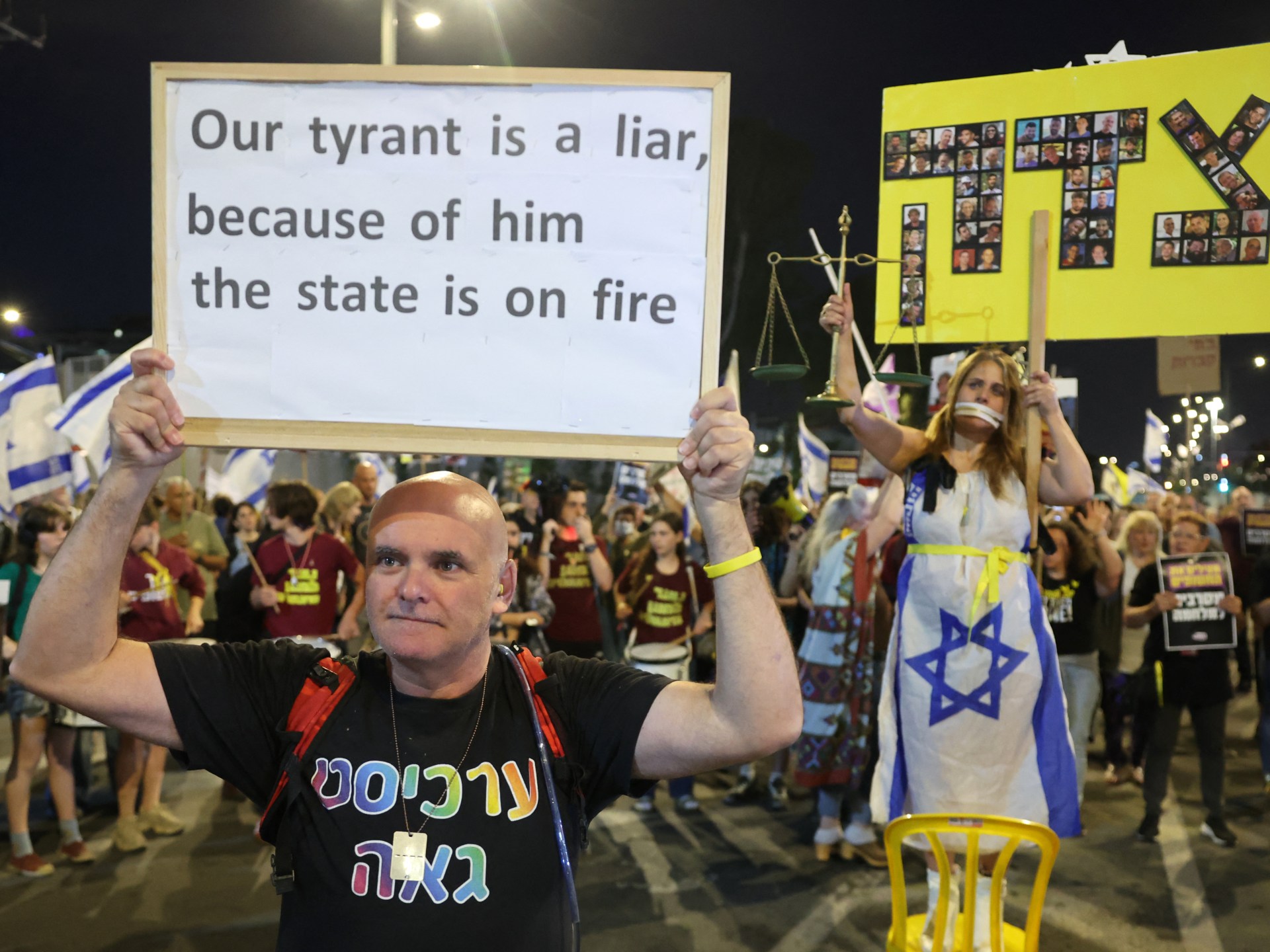
Thousands of Israelis have gathered outside the Ministry of Defence in Tel Aviv, urging the government to prioritise the release of captives still held in Gaza instead of escalating military operations in the Palestinian territory.
The demonstration on Saturday was held as Prime Minister Benjamin Netanyahu’s government authorised the mobilisation of up to 60,000 reserve troops, signalling plans to intensify its assault on the besieged Palestinian enclave.
One protester held aloft a placard castigating Netanyahu that read, “our tyrant is a liar, because of him the state is on fire”.
Government officials claim an expanded military offensive on Gaza will pressure Hamas into releasing the 59 remaining captives, but critics argue it further endangers their lives. Ending the fleeting ceasefire, which saw Palestinian prisoners exchanged for Israeli captives earlier this year, has not led to any more releases.
A video circulated by Hamas on Saturday purported to show one of the Israeli captives, whom local media identified as Maxim Herkin. In the four-minute video posted online, Herkin is seen being rescued by Hamas members after an Israeli attack struck a tunnel, burying and injuring the Israeli captive.
Families of the captives released a statement saying they spent the Sabbath gripped by “excruciating anxiety” after news of the government’s planned escalation and the effect it could have on those still held in Gaza.
The Bring Them Home Campaign, a group representing the relatives, condemned the move as reckless.
“Israel is on its way to sinking into the Gaza mud in the name of the illusion that it is possible to achieve any victory without returning our brothers and sisters from captivity,” the group said in a post on X. “Expanding the fighting will endanger the kidnapped, the living and the dead alike.”
They urged Netanyahu to abandon the offensive and instead reach an agreement that would secure the captives’ return. “Stop this mistake,” the group said.
‘Protests not enough to influence Netanyahu’
Speaking to Al Jazeera, Israeli journalist Gideon Levy said the protest movement remains consistent, but lacks the momentum to challenge Netanyahu’s coalition. “It’s the same old protest, very courageous and devoted, but not big enough to influence Netanyahu,” Levy said.
He noted that a large segment of Israeli society continues to support the war effort, even amid rising frustration from the captives’ families, and that “when [Israelis] are called to war, they will obey.”
Netanyahu, speaking Thursday at a public event in Jerusalem, seemed to suggest that defeating Hamas remains Israel’s top priority instead of the release of captives. “We want to bring all our hostages home,” he said. “The war has a supreme goal, and the supreme goal is victory over our enemies, and this we will achieve.”
Captives’ families have accused Netanyahu of undermining previous attempts to reach a truce and swap deal. Some believe his refusal to compromise reflects political motives, aimed at ensuring the survival of his far-right coalition government, rather than genuine concern for the captives.
Middle East
Iran reasserts uranium enrichment rights as further US talks delayed | Nuclear Energy News
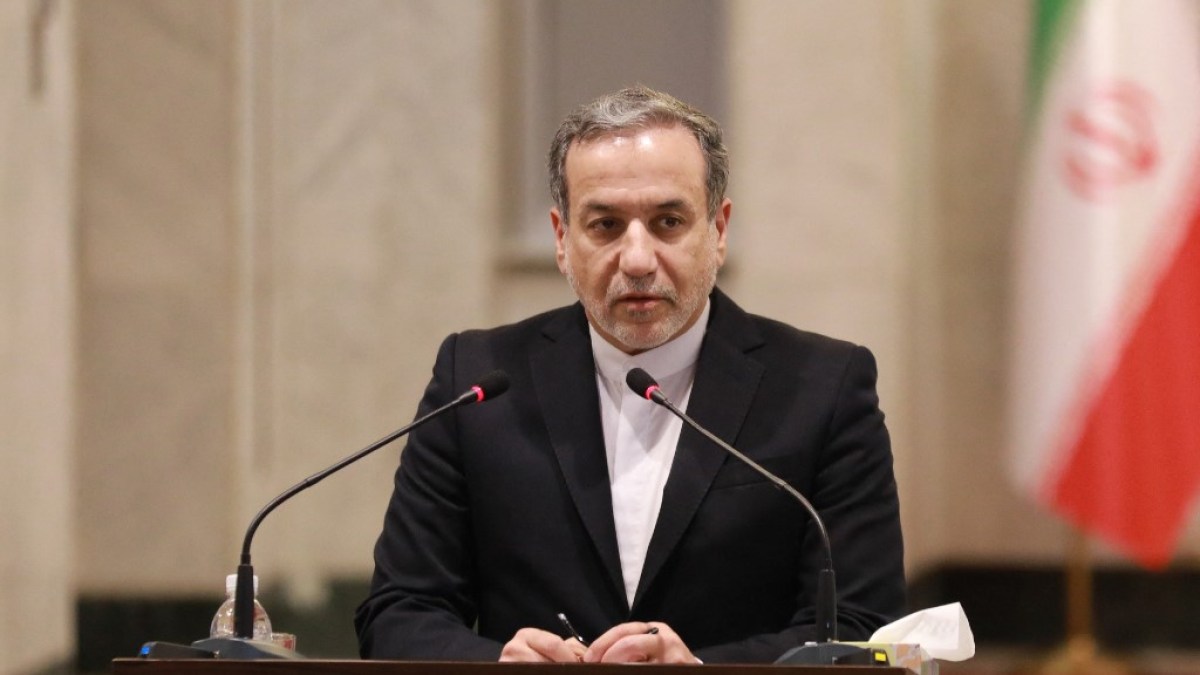
Foreign Minister Araghchi insists Iran’s nuclear activities are civilian in nature.
Iran has defended its right to enrich uranium, doubling down on a long-held stance as the next round of nuclear negotiations with the United States in Oman were abruptly delayed.
Foreign Minister Abbas Araghchi took to social media on Saturday to declare, “Iran has every right to possess the full nuclear fuel cycle,” referencing the country’s membership in the Nuclear Non-Proliferation Treaty (NPT).
He added, “There are several NPT members which enrich uranium while wholly rejecting nuclear weapons,” underlining Iran’s argument that its nuclear activities are civilian in nature.
“Maximalist positioning and incendiary rhetoric achieve nothing except eroding the chances of success,” added Araghchi, in reference to the US position that Iran must stop all enrichment activities.
In a Thursday interview with Fox News, US Secretary of State Marco Rubio urged Iran to halt its enrichment efforts, arguing, “the only countries in the world that enrich uranium are the ones that have nuclear weapons.” However, countries like Germany, Japan and Brazil also conduct enrichment without possessing nuclear arsenals.
The comments come after a fourth round of indirect talks between Washington and Tehran, originally scheduled for Saturday, was postponed.
I generally refrain from airing arguments on key negotiation elements through the media.
What I will say is that repeating falsehoods will not change basic facts. As a founding signatory to the NPT, Iran has every right to possess the full nuclear fuel cycle. Moreover, there…
— Seyed Abbas Araghchi (@araghchi) May 2, 2025
Oman, acting as a mediator, cited “logistical reasons” for the delay. A new date remains unconfirmed, with one Iranian official telling the Reuters news agency it would depend on “the US approach”.
The setback follows a new wave of US sanctions tied to Iran’s oil sales and alleged continued support for Yemen’s Houthi rebels. Tehran responded by accusing Washington of sending “contradictory messages” that undermined diplomacy.
France added to the uncertainty earlier this week when Foreign Minister Jean-Noel Barrot claimed Iran was “on the verge of acquiring nuclear weapons” – a charge Tehran dismissed as “simply absurd”.
Iran, which insists it does not seek a bomb, has consistently maintained its nuclear programme complies with IAEA oversight.
Araghchi reiterated that Iran’s right to enrich was “non-negotiable”, even as IAEA chief Rafael Grossi suggested on Wednesday that any enriched material in Iran could be either dissolved or exported if a deal were reached.
The diplomatic deadlock comes as global powers weigh whether meaningful progress can still be achieved on reviving the 2015 nuclear deal brokered by world powers, which collapsed after the US, under the first Donald Trump presidential term, unilaterally abandoned it in 2018.
The 2015 deal, known as the Joint Comprehensive Plan of Action (JCPOA) saw Iran curtail its nuclear programme in exchange for sanctions relief.
Middle East
Dozens of Palestinians starved to death under Israel’s blockade of Gaza | Israel-Palestine conflict News
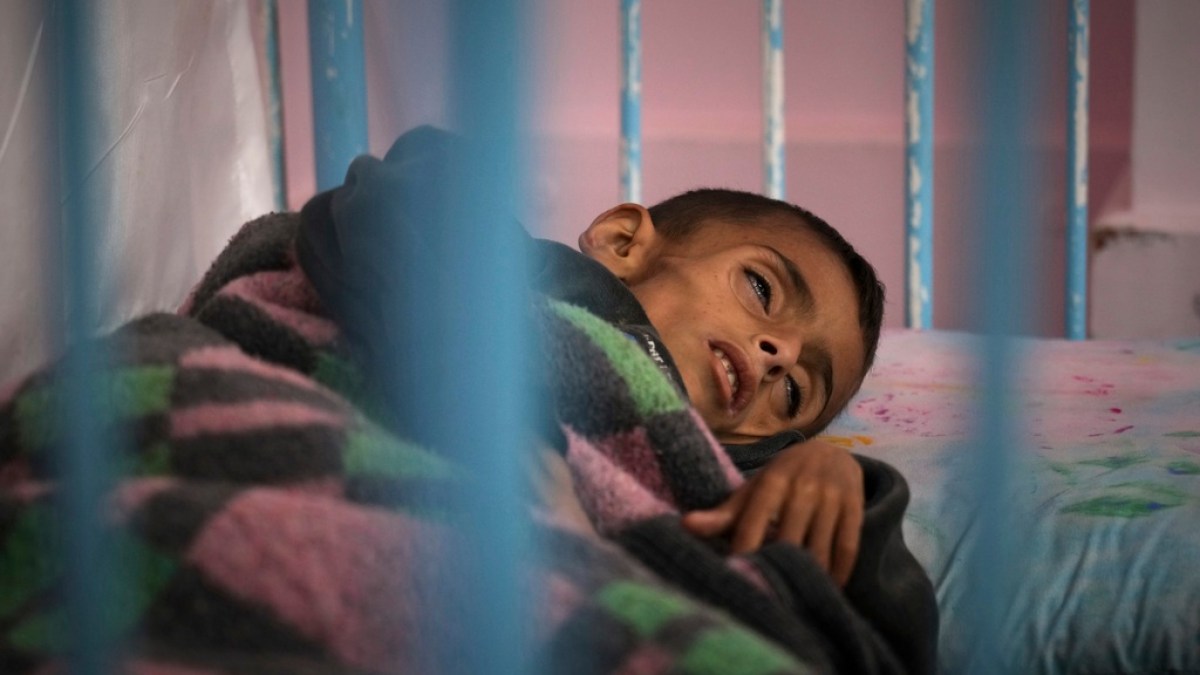
As trucks carrying vital supplies pile up at border with Egypt, hungry children look through rubbish for food.
At least 57 Palestinians have starved to death in Gaza as Israel’s punishing blockade of food, water, and other critical aid to the besieged enclave stretches into its third month amid relentless bombardment.
Gaza’s Government Media Office said on Saturday that most of the victims were children, as well as the sick and elderly, condemning the “continued use of food by the Israeli occupation as a weapon of war” and urging the international community to exert pressure on Israel to reopen the borders and allow in aid.
Gaza has been under total Israeli blockade since March 2, video obtained by Al Jazeera Arabic showing large numbers of trucks carrying vital supplies piling up on the border between Egypt and the Gaza Strip on Saturday, the queue extending south beyond the city of Arish, located approximately 45 kilometres (28 miles) from Rafah border crossing.
Al Jazeera’s team identified one of the latest victims on Saturday, a baby girl called Janan Saleh al-Sakafi, who died of malnutrition and dehydration in the Rantisi Hospital, west of Gaza City. More than 9,000 children have been admitted to hospital for treatment for acute malnutrition since the start of the year, according to the United Nations.
Reporting from Gaza City, Al Jazeera’s Hani Mahmoud said he had witnessed heartbreaking scenes of children rifling through rubbish, “looking for whatever is left of canned food products”. The enclave, he added, had reached a “critical” point with international organisations out of supplies and community kitchens unable to prepare meals for displaced people.
“Finding a single meal has become an impossible quest,” Ahmad al-Najjar, a displaced Palestinian in Gaza City, told Al Jazeera. “People here have witnessed one charity after another declaring they’re out of supplies, that they’re shutting down their operations because they’re in no position to … offer the population the needed relief.”
“It’s frustrating and infuriating to have trucks piling up on the other side of the fence be denied entrance while the people, even children, are in dire conditions.”
Hospitals face ‘acute shortages’
Suhaib al-Hams, the director of the Kuwaiti Hospital in Rafah, said in a statement that medical services were experiencing “acute shortages in more than 75 percent of essential medicines”, with only around a week of supplies left.
He warned that most of the enclave’s medical services will stop without “immediate intervention” to reopen borders and allow medical and humanitarian aid through. He added that patients, who are “slowly dying every day without treatment”, needed to be evacuated urgently.
The continued blockade is the longest such closure the Gaza Strip has ever faced, and has come as Israeli forces continue bombarding the territory, killing at least 70 Palestinians and wounding 275 others over the two days spanning Thursday to Saturday morning, according to the Health Ministry.

On Saturday, two women were killed in an Israeli air raid on a house in the town of al-Fakhari near Gaza’s southern city of Khan Younis, according to reports from Al Jazeera Arabic.
Separately, a fisherman was killed and another injured by an Israeli naval attack off the coast of Gaza City.
Later in the day, two Palestinians were killed in an Israeli drone attack on southern Gaza’s al-Mawasi area, once an Israeli-designated “safe zone”.
Israel’s war on Gaza has killed at least 52,495 people and wounded 118,366 since October 7, 2023, according to the Health Ministry. Thousands more missing under the rubble are presumed dead.
-
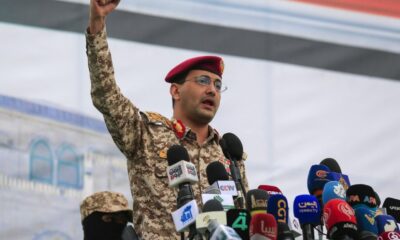
 Conflict Zones2 days ago
Conflict Zones2 days agoYemen’s Houthis launch missiles at Israel, army says it intercepts | Houthis News
-

 Europe2 days ago
Europe2 days agoPrince Harry says father, King Charles, no longer speaks to him but hopes to reconcile
-

 Africa2 days ago
Africa2 days agoFear and uncertainty grip Haitian workers in Texas meatpacking plants amid immigration crackdown
-

 Europe2 days ago
Europe2 days agoJD Vance says war in Ukraine ‘not going to end any time soon,’ hours after US signs minerals deal with Kyiv
-

 Middle East2 days ago
Middle East2 days agoDrones hit ‘Freedom Flotilla’ Gaza aid ship in international waters | Israel-Palestine conflict News
-

 Sports2 days ago
Sports2 days agoJalen Brunson game-winner lifts New York Knicks over Detroit Pistons and into second round of NBA playoffs
-

 Education2 days ago
Education2 days agoTrump says he will revoke Harvard’s tax-exempt status
-

 Europe2 days ago
Europe2 days agoAnalysis: US tariffs could make Europe ‘Great Again’ by lowering prices




